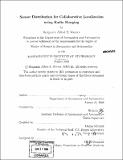| dc.contributor.advisor | Nicholas Roy and Megan Mitchell. | en_US |
| dc.contributor.author | Werner, Benjamin Alfred S | en_US |
| dc.contributor.other | Massachusetts Institute of Technology. Dept. of Aeronautics and Astronautics. | en_US |
| dc.date.accessioned | 2010-02-09T16:56:30Z | |
| dc.date.available | 2010-02-09T16:56:30Z | |
| dc.date.copyright | 2008 | en_US |
| dc.date.issued | 2008 | en_US |
| dc.identifier.uri | http://hdl.handle.net/1721.1/51649 | |
| dc.description | Thesis (S.M.)--Massachusetts Institute of Technology, Dept. of Aeronautics and Astronautics, 2008. | en_US |
| dc.description | Includes bibliographical references (p. 119-122). | en_US |
| dc.description.abstract | This thesis explores the localization of a group of networked agents using range measurements between themselves in a global reference frame. While operating in an environment with sparse Global Positioning System availability and intermittent inter-agent range measurements, additional sensors may be needed to maintain a given level of position accuracy. This research explores the balance between penalties associated with the addition of sensors and the ability to localize all agents to a specified accuracy. The problem is defined as an optimization formulation that minimizes the cost of additional sensors over the group while requiring accurate positioning knowledge for all agents. The first result of this thesis is a novel method for solving the posed optimization problem. This method avoids searching all possible instrumentations by exploiting structure in the problem: testing a single sensor configuration for localization accuracy sometimes allows for implicit elimination of multiple configurations. Discerning the best configuration to test for localization accuracy decreases the re- quired search time to solve the optimization problem. The second contribution of this thesis comes from the application of the optimization's search procedure to problem of distributing inertial measurement units to a group of agents. The effects of various environmental conditions on the required distribution of inertial measurement units are investigated. | en_US |
| dc.description.statementofresponsibility | by Benjamin Alfred S. Werner. | en_US |
| dc.format.extent | 122 p. | en_US |
| dc.language.iso | eng | en_US |
| dc.publisher | Massachusetts Institute of Technology | en_US |
| dc.rights | M.I.T. theses are protected by
copyright. They may be viewed from this source for any purpose, but
reproduction or distribution in any format is prohibited without written
permission. See provided URL for inquiries about permission. | en_US |
| dc.rights.uri | http://dspace.mit.edu/handle/1721.1/7582 | en_US |
| dc.subject | Aeronautics and Astronautics. | en_US |
| dc.title | Sensor distribution for collaborative localization using radio ranging | en_US |
| dc.type | Thesis | en_US |
| dc.description.degree | S.M. | en_US |
| dc.contributor.department | Massachusetts Institute of Technology. Department of Aeronautics and Astronautics | |
| dc.identifier.oclc | 496828432 | en_US |
